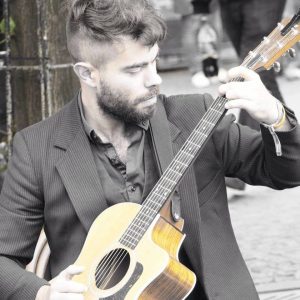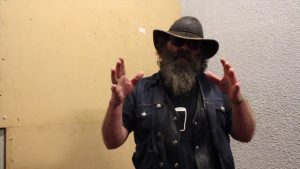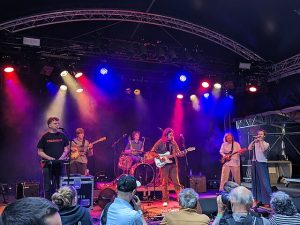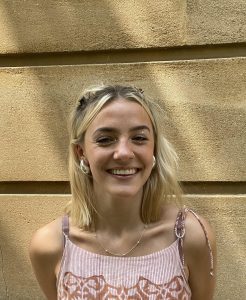
Only Just: An Interview with No Love in the House of Gold
by Griffin Gudaitis | October 26, 2023
No Love in the House of Gold started as the liminal music project of Sam Cowell and Edward Spence, both from Sheffield, UK. What begun as a joke, the project has amassed millions of streams on Spotify, produced five albums, and currently boasts 200,000 monthly listeners. Sam, Edward, and I spoke via zoom about our shared love for vaporwave music, the duo’s inspirations in analog horror, and the difference that art makes in our world.
You said that No Love started out as a joke. How so?
ES: I have this ongoing document on my phone, where I just put down any sort of words, phrases, or ideas I get. Otherwise, I’m going to completely forget. The name “No Love in the House of Gold” was an amalgam of different ideas I’d had over the course of a few months I squished into one phrase. If I remember right, the project became more serious because we liked the name so much and we didn’t want to waste it on a joke project.
SC: I wanted to create something in the vein of Death’s Dynamic Shroud. They’re a vaporwave artist. I had been listening to quite a lot. Me and Ed have made creative projects together since we were very, very young.
ES: We’ve made tracks together in a mixing studio since we were thirteen.
Has your music taken a different tone since? Do you find yourselves producing music to fit under the name “No Love”?
SC: Absolutely, I can attest that [“there is no such thing as a jellyfish”] was the first album I really viewed as a big undertaking. It was the first album where I really paid attention to “This is exactly what I want it to sound like. This is what I want it to be.” With [“void_19###” and “atlantis part 2”], I didn’t necessarily make them with the idea that “I have this specific vision to turn into something tangible.” It was more so, I wanted to make some interesting music and I’m going to mess around with a bunch of tools and see what I create, then fit them together, and trim them all down into a framework I like.
Is there a certain feeling you want to capture in your music? “[A]tlantis part 2” has a postapocalyptic feel. I noticed the album’s cover art of a futuristic city reaching the sky. Is your music a response to the kind of world we live in today—the mundane, humdrum of everyday existence?
SC: There is a silly story behind “atlantis part 2”, where Atlantis gets rediscovered and turned into a sort of tourist attraction. The idea was almost a commentary on the urbanization of the world we live in, this weird sort of liminality and oddness mixed with a lot of things. I’ve lived in cities a lot of my life and it’s sort of a reflection of that. There’s a lot of tape hiss in the background of the album that almost simulates the sound of rain and cars and general hum of city life. It was familiar and brings comfort but at the same time uneasy and not quite right.
ES: There is a consistent sort of melancholy. It’s not quite sadness. It’s a bit like a fog—the tape hiss as an audio fog.

Yes, and with the advent of the internet, ‘liminality’ seems to define our existence today: you can be friends with someone online and not know them in real life. Have you two been children of the Internet?
SC: We’re both children of the internet. We spent the majority of our childhood making random things for the internet. When we were younger—I don’t know if you know what Whitie P’s are—it’s a sort of genre ages ago from the dark ages of YouTube. People make these jokey videos, where they mash up episodes of kids’ shows and populate it with memes. It’s the same idea as our music really. This sort of feeling of unease, of delving into something that isn’t made for you, that isn’t there for you. You feel you almost shouldn’t be listening. That intrigue and mystery is really, really captivating.
Have you two heard of the YouTube channel, Local 58? It makes fake public safety announcements in the style of 1950’s television with a surrealist take.
ES: That’s another thing with analog horror, the genre Local 58 is in. You’re finding out something that you’re not supposed to know for cosmic reasons but through man-made devices. We both love Local 58.
What other inspirations from the horror genre feed into your music?
ES: I’m a huge fan of Stephen King. “The Shining” and “Pet Sematary” are some of the first books that I ever finished reading. To this day, I like horror films as well as ominous films in general like “The Witch”. There’s another inspiration, a podcast called “I’m in Eskew”. In one episode, they talk about the trajectory of horror to its logical conclusion— liminality—and one of the first lines was, “People don’t scare me. Places scare me.” The setting itself is the horror. The setting is the antagonist. The world against the person— that’s where the horror comes from.
Do you two have anything forthcoming? You don’t have to give away titles if you don’t want to …
SC: I don’t think we’ll give away titles because we don’t have any yet. I think we’d like to experiment more with live instruments: guitars, pianos, things that we can play live. We both play tons. I play guitar, piano, bass, and drums. Ed plays bass and drums. We hope to incorporate that live instrumentation into an album, maybe.
Do you find that when you sit down to create music, you’re jumping from one instrument to another?
SC: Sometimes I’ll sit down and write a song on bass guitar and then the song will manifest itself on a synthesizer instead. It’s really interesting to see how that jump works.
ES: When I start a song, I have no idea how it’s going to turn out. I don’t know what the instrumentation is going to be, I don’t know how the procession is going to be. I’m just pushed in a direction.
Does surprise play a big part in the fun of the music-making process?
SC: It’s sort of like a compelling force, pushing you in a certain direction and you don’t really know where it’s going to take you. You’re just along for the ride, really.
ES: We’re not the players. We’re just the pawns.
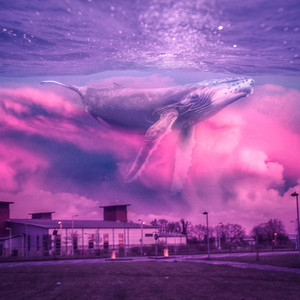
As a fiction writer, I think the most interesting part of creating art is the journey. Do you think the process of creation changes you at all?
SC: It’s interesting to compare a finished project to what you originally had and to recognize all the different ideas woven in from the start.
Is there a particular piece that does that?
SC: It’s probably a track from our least popular album, “01/02/1996”. Not many people have listened to that one. I think it’s quite odd, and that’s something coming from us. It’s certainly our least accessible album. Two songs on it—“SS Mary” and “Small Creature, Valiant Approach”—came from me and Ed setting up a room with a bunch of instruments and a bunch of microphones, just moving between instruments and the opening track of “Blonde Tongue Audio Baton” by shoegaze band, Swirlies, has a similar cacophonous sound. It almost sounds like falling in a black hole, a sort of dimensional change, battering around in a world of strange sounds. You both recognize it and don’t recognize it. Turns out they were tearing duct tape into a mic.
Does shoegaze influence your work?
ES: Definitely. There’s this band that’s sort of a cross between shoegaze and ambient called Belong. My favourite albums from them are “October Language” and “Common Era”. Outside liminality completely, we both have very diverse music tastes.
SC: I listen to pretty much everything. In terms of ambience, Lilien Rosarian is another artist that we take inspiration from. We’d like to name drop her because not enough people listen to her stuff, and it’s really interesting—specifically her album, “a day in bel bruit”. It’s one of my favourite ambient albums, and I think it’s absolutely beautiful. I’m also very into post hardcore, 90’s emo, and 2000’s revival emo. Also, a 90’s psychedelic Japanese band called Fishmans.
Who have you been in touch with since your music became popular?
SC: After I released “atlantis part 2”, I got talking to the owner of a label called Sunset Grid. It was really interesting talking to someone more in the Vaporwave community. Outside of musicians, it’s been amazing to talk to people who have enjoyed our music and hear what they enjoyed and to learn about the ways we’ve impacted people’s lives.
ES: I absolutely love the messages we get on our Instagrams because it’s amazing. People will text us to say they love our music. It’s incomprehensible. We never thought this would happen two years ago [when we started making music].
SC: It doesn’t even feel real. It feels odd to have impacted so many people with something that we started as a silly joke. We thought no one would hear. It’s such a weird experience. I can’t describe it in words.
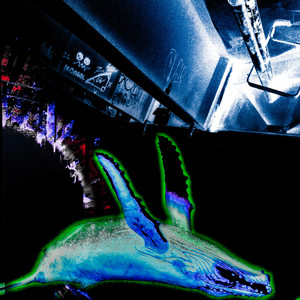
Why do you think it is important to make music?
SC: I don’t think it’s necessary for people to hear what I make but it’s necessary for me to make music. Music is the thing I know how to do. Music is the thing I am driven to do. Whenever I’m not making music, I’m not living.
ES: Absolutely same. I’m less professionally good at it than Sam. I have sort of a compulsion to make art. In my lectures, if I’m not listening, I’ll draw things I see in my vision. I’m always tapping drumbeats or just making kaleidoscopic pictures on Photoshop. Otherwise, I’ll explode.
SC: I think it’s important to inspire other people to make art. I get lots of messages like “What do you use to make your music? I’d love to get into that.” One of my main goals is to inspire other people to do the same because music is such a healing force. It’s a force for good and bad, but it can be a force for good. If I can get one person to release their music that they’ve been hiding and release it into the world, I think that’s enough for me.
So making music is a way that you interact with the world?
SC: It’s the way in which I completely understand the world, the lenses through which I view life. I am constantly viewing things in terms of concepts I want to produce into art. It’s almost an unhealthy obsession in a way.
Is there anything else that you want to mention before the end of the interview?
SC: No one outside No Love in the House of Gold knows, but we have an unreleased first album. It was a joke, a play on ambient music. We’d always loved it, but we decided to make an album that poked fun at it to an absurdist degree. It’s called “An Essay on the Nature of Man.”
Sounds like Descartes.
SC: We got one song that’s 33 minutes long, another that’s 7, another that’s 9. It’ll probably stay unreleased.
ES: I like what you said about the title sounding like Descartes. That is, if Descartes was good. We’re being humble about [No Love] being a joke, but the world wasn’t ready.∎
Words by Griffin Gudaitis. Photography courtesy of No Love in the House of Gold.
